Wider Professional Practice and Development in Education and Training
VerifiedAdded on 2023/06/09
|16
|5574
|286
AI Summary
This report covers the description related to all the elements such as political, social and economic which has to consider in order to create educational strategies. It explores the concepts of professionalism and dual professionalism in education and training, ways in which social, political and economic factors influence education policy, roles of stakeholders and external bodies in education and training, and more.
Contribute Materials
Your contribution can guide someone’s learning journey. Share your
documents today.
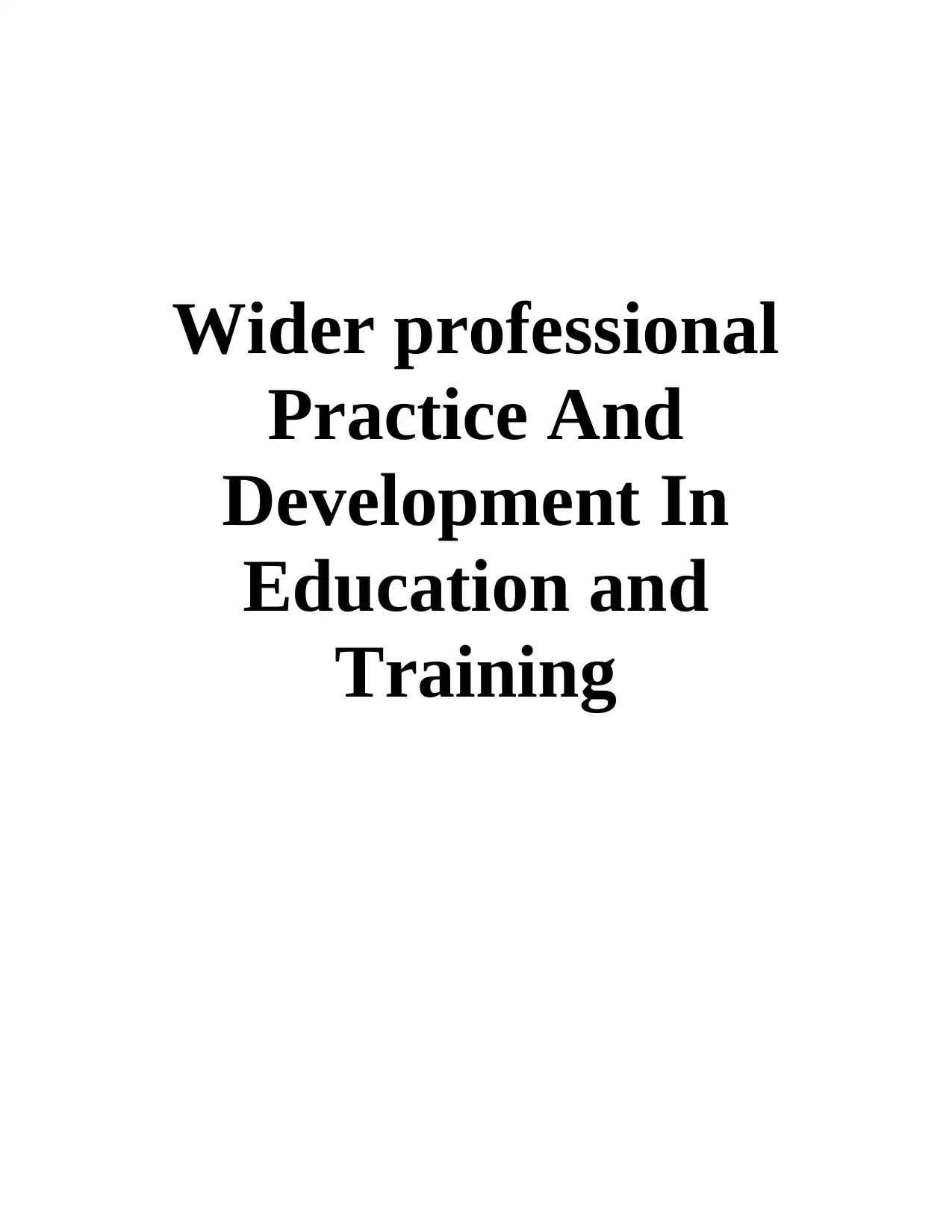
Wider professional
Practice And
Development In
Education and
Training
Practice And
Development In
Education and
Training
Secure Best Marks with AI Grader
Need help grading? Try our AI Grader for instant feedback on your assignments.
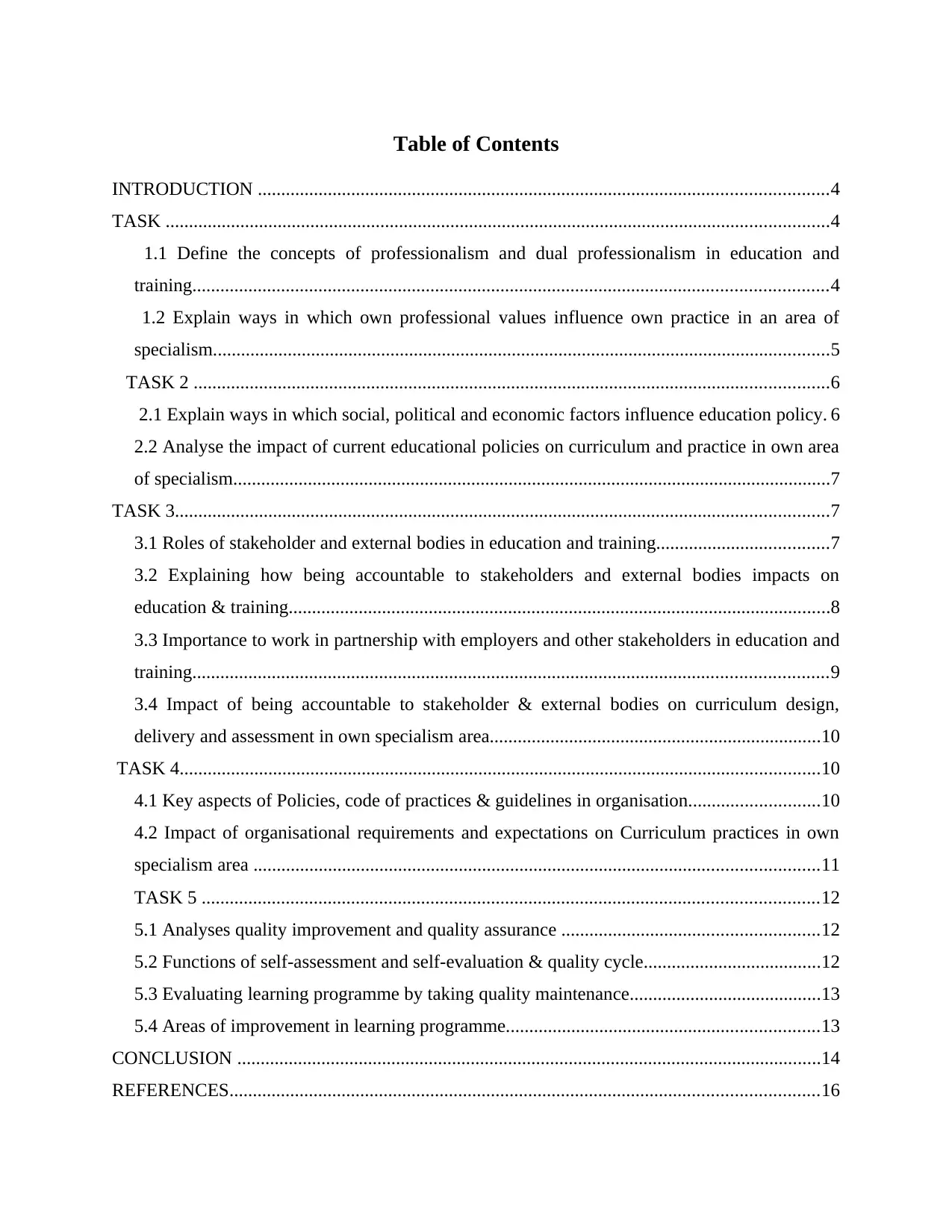
Table of Contents
INTRODUCTION ..........................................................................................................................4
TASK ..............................................................................................................................................4
1.1 Define the concepts of professionalism and dual professionalism in education and
training........................................................................................................................................4
1.2 Explain ways in which own professional values influence own practice in an area of
specialism....................................................................................................................................5
TASK 2 ........................................................................................................................................6
2.1 Explain ways in which social, political and economic factors influence education policy. 6
2.2 Analyse the impact of current educational policies on curriculum and practice in own area
of specialism................................................................................................................................7
TASK 3............................................................................................................................................7
3.1 Roles of stakeholder and external bodies in education and training.....................................7
3.2 Explaining how being accountable to stakeholders and external bodies impacts on
education & training....................................................................................................................8
3.3 Importance to work in partnership with employers and other stakeholders in education and
training........................................................................................................................................9
3.4 Impact of being accountable to stakeholder & external bodies on curriculum design,
delivery and assessment in own specialism area.......................................................................10
TASK 4.........................................................................................................................................10
4.1 Key aspects of Policies, code of practices & guidelines in organisation............................10
4.2 Impact of organisational requirements and expectations on Curriculum practices in own
specialism area .........................................................................................................................11
TASK 5 ....................................................................................................................................12
5.1 Analyses quality improvement and quality assurance .......................................................12
5.2 Functions of self-assessment and self-evaluation & quality cycle......................................12
5.3 Evaluating learning programme by taking quality maintenance.........................................13
5.4 Areas of improvement in learning programme...................................................................13
CONCLUSION .............................................................................................................................14
REFERENCES..............................................................................................................................16
INTRODUCTION ..........................................................................................................................4
TASK ..............................................................................................................................................4
1.1 Define the concepts of professionalism and dual professionalism in education and
training........................................................................................................................................4
1.2 Explain ways in which own professional values influence own practice in an area of
specialism....................................................................................................................................5
TASK 2 ........................................................................................................................................6
2.1 Explain ways in which social, political and economic factors influence education policy. 6
2.2 Analyse the impact of current educational policies on curriculum and practice in own area
of specialism................................................................................................................................7
TASK 3............................................................................................................................................7
3.1 Roles of stakeholder and external bodies in education and training.....................................7
3.2 Explaining how being accountable to stakeholders and external bodies impacts on
education & training....................................................................................................................8
3.3 Importance to work in partnership with employers and other stakeholders in education and
training........................................................................................................................................9
3.4 Impact of being accountable to stakeholder & external bodies on curriculum design,
delivery and assessment in own specialism area.......................................................................10
TASK 4.........................................................................................................................................10
4.1 Key aspects of Policies, code of practices & guidelines in organisation............................10
4.2 Impact of organisational requirements and expectations on Curriculum practices in own
specialism area .........................................................................................................................11
TASK 5 ....................................................................................................................................12
5.1 Analyses quality improvement and quality assurance .......................................................12
5.2 Functions of self-assessment and self-evaluation & quality cycle......................................12
5.3 Evaluating learning programme by taking quality maintenance.........................................13
5.4 Areas of improvement in learning programme...................................................................13
CONCLUSION .............................................................................................................................14
REFERENCES..............................................................................................................................16
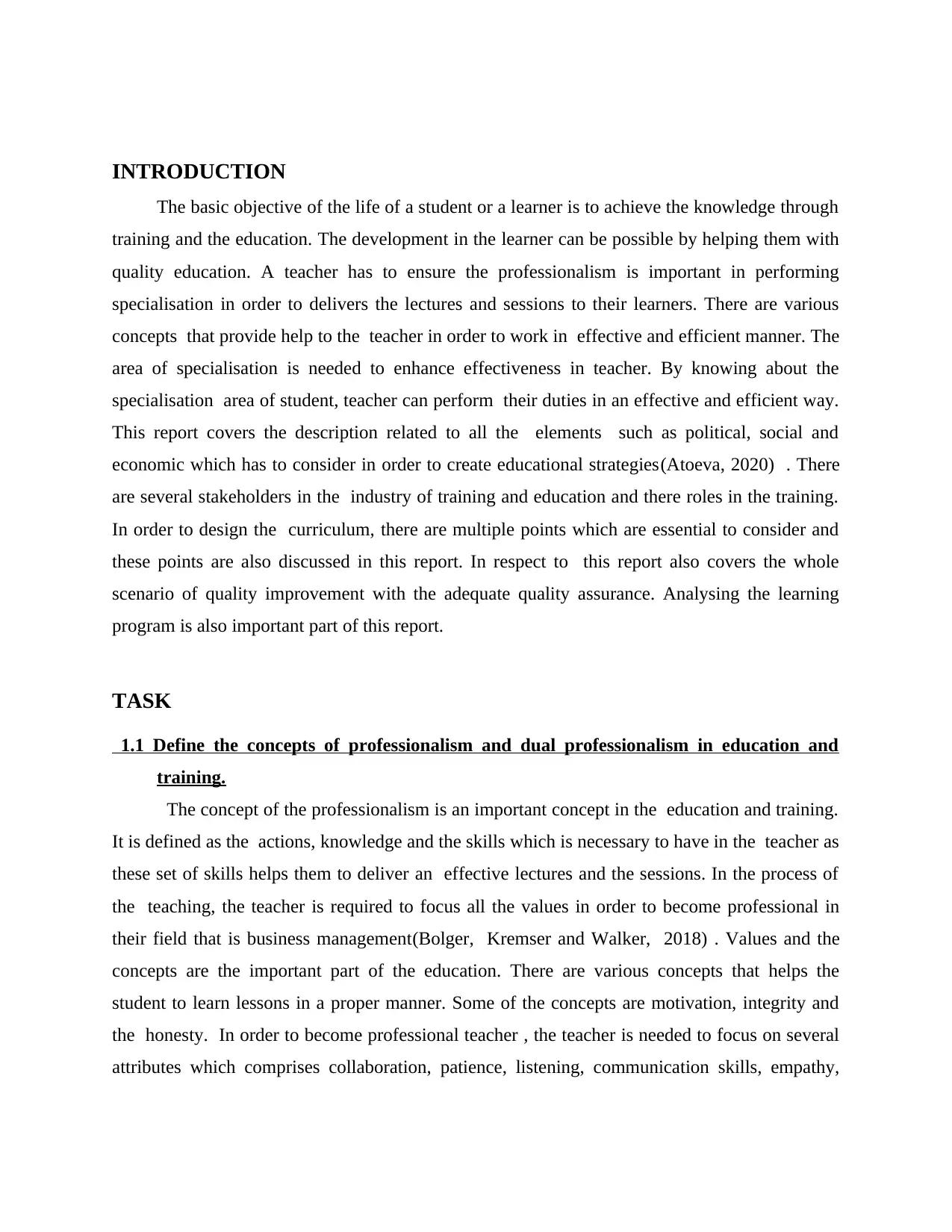
INTRODUCTION
The basic objective of the life of a student or a learner is to achieve the knowledge through
training and the education. The development in the learner can be possible by helping them with
quality education. A teacher has to ensure the professionalism is important in performing
specialisation in order to delivers the lectures and sessions to their learners. There are various
concepts that provide help to the teacher in order to work in effective and efficient manner. The
area of specialisation is needed to enhance effectiveness in teacher. By knowing about the
specialisation area of student, teacher can perform their duties in an effective and efficient way.
This report covers the description related to all the elements such as political, social and
economic which has to consider in order to create educational strategies(Atoeva, 2020) . There
are several stakeholders in the industry of training and education and there roles in the training.
In order to design the curriculum, there are multiple points which are essential to consider and
these points are also discussed in this report. In respect to this report also covers the whole
scenario of quality improvement with the adequate quality assurance. Analysing the learning
program is also important part of this report.
TASK
1.1 Define the concepts of professionalism and dual professionalism in education and
training.
The concept of the professionalism is an important concept in the education and training.
It is defined as the actions, knowledge and the skills which is necessary to have in the teacher as
these set of skills helps them to deliver an effective lectures and the sessions. In the process of
the teaching, the teacher is required to focus all the values in order to become professional in
their field that is business management(Bolger, Kremser and Walker, 2018) . Values and the
concepts are the important part of the education. There are various concepts that helps the
student to learn lessons in a proper manner. Some of the concepts are motivation, integrity and
the honesty. In order to become professional teacher , the teacher is needed to focus on several
attributes which comprises collaboration, patience, listening, communication skills, empathy,
The basic objective of the life of a student or a learner is to achieve the knowledge through
training and the education. The development in the learner can be possible by helping them with
quality education. A teacher has to ensure the professionalism is important in performing
specialisation in order to delivers the lectures and sessions to their learners. There are various
concepts that provide help to the teacher in order to work in effective and efficient manner. The
area of specialisation is needed to enhance effectiveness in teacher. By knowing about the
specialisation area of student, teacher can perform their duties in an effective and efficient way.
This report covers the description related to all the elements such as political, social and
economic which has to consider in order to create educational strategies(Atoeva, 2020) . There
are several stakeholders in the industry of training and education and there roles in the training.
In order to design the curriculum, there are multiple points which are essential to consider and
these points are also discussed in this report. In respect to this report also covers the whole
scenario of quality improvement with the adequate quality assurance. Analysing the learning
program is also important part of this report.
TASK
1.1 Define the concepts of professionalism and dual professionalism in education and
training.
The concept of the professionalism is an important concept in the education and training.
It is defined as the actions, knowledge and the skills which is necessary to have in the teacher as
these set of skills helps them to deliver an effective lectures and the sessions. In the process of
the teaching, the teacher is required to focus all the values in order to become professional in
their field that is business management(Bolger, Kremser and Walker, 2018) . Values and the
concepts are the important part of the education. There are various concepts that helps the
student to learn lessons in a proper manner. Some of the concepts are motivation, integrity and
the honesty. In order to become professional teacher , the teacher is needed to focus on several
attributes which comprises collaboration, patience, listening, communication skills, empathy,
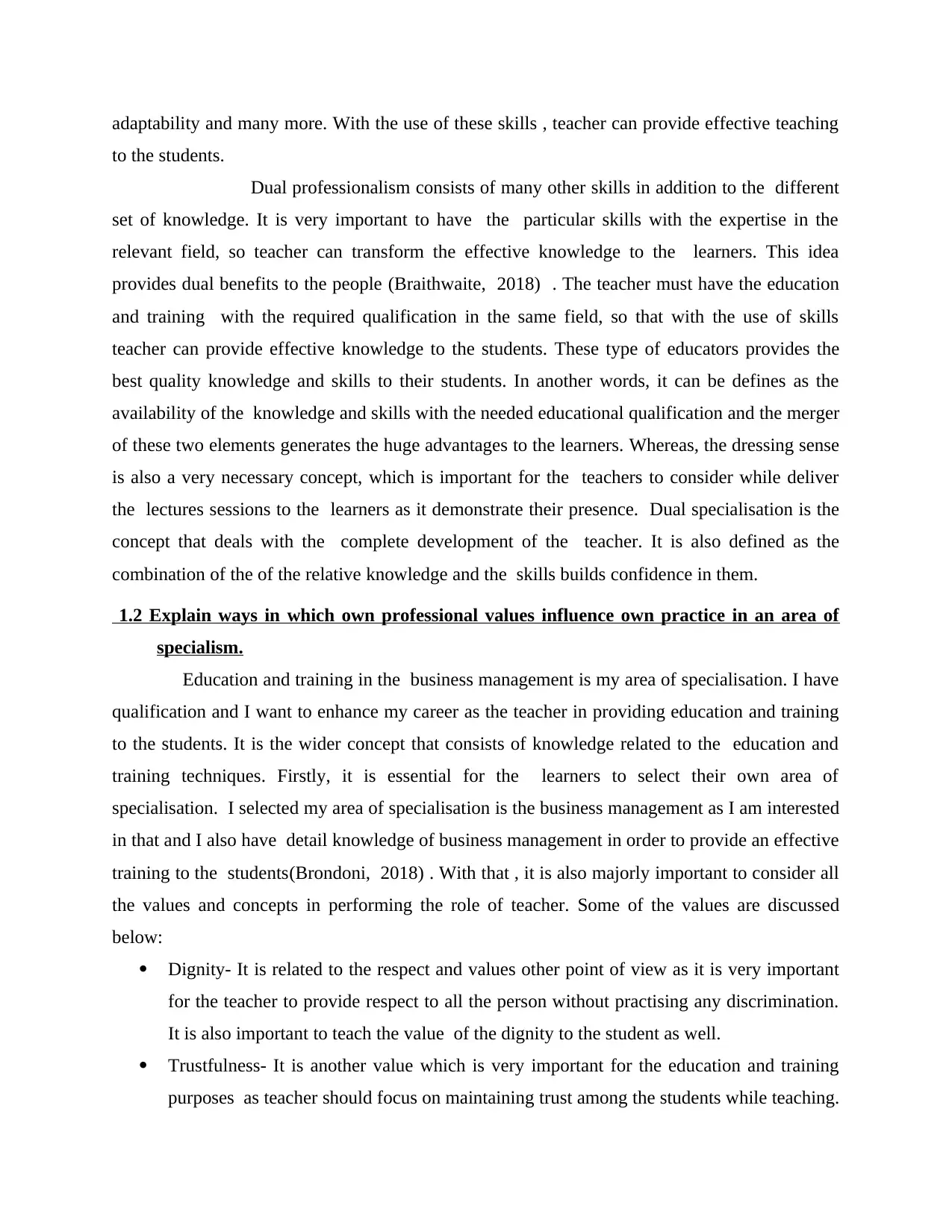
adaptability and many more. With the use of these skills , teacher can provide effective teaching
to the students.
Dual professionalism consists of many other skills in addition to the different
set of knowledge. It is very important to have the particular skills with the expertise in the
relevant field, so teacher can transform the effective knowledge to the learners. This idea
provides dual benefits to the people (Braithwaite, 2018) . The teacher must have the education
and training with the required qualification in the same field, so that with the use of skills
teacher can provide effective knowledge to the students. These type of educators provides the
best quality knowledge and skills to their students. In another words, it can be defines as the
availability of the knowledge and skills with the needed educational qualification and the merger
of these two elements generates the huge advantages to the learners. Whereas, the dressing sense
is also a very necessary concept, which is important for the teachers to consider while deliver
the lectures sessions to the learners as it demonstrate their presence. Dual specialisation is the
concept that deals with the complete development of the teacher. It is also defined as the
combination of the of the relative knowledge and the skills builds confidence in them.
1.2 Explain ways in which own professional values influence own practice in an area of
specialism.
Education and training in the business management is my area of specialisation. I have
qualification and I want to enhance my career as the teacher in providing education and training
to the students. It is the wider concept that consists of knowledge related to the education and
training techniques. Firstly, it is essential for the learners to select their own area of
specialisation. I selected my area of specialisation is the business management as I am interested
in that and I also have detail knowledge of business management in order to provide an effective
training to the students(Brondoni, 2018) . With that , it is also majorly important to consider all
the values and concepts in performing the role of teacher. Some of the values are discussed
below:
Dignity- It is related to the respect and values other point of view as it is very important
for the teacher to provide respect to all the person without practising any discrimination.
It is also important to teach the value of the dignity to the student as well.
Trustfulness- It is another value which is very important for the education and training
purposes as teacher should focus on maintaining trust among the students while teaching.
to the students.
Dual professionalism consists of many other skills in addition to the different
set of knowledge. It is very important to have the particular skills with the expertise in the
relevant field, so teacher can transform the effective knowledge to the learners. This idea
provides dual benefits to the people (Braithwaite, 2018) . The teacher must have the education
and training with the required qualification in the same field, so that with the use of skills
teacher can provide effective knowledge to the students. These type of educators provides the
best quality knowledge and skills to their students. In another words, it can be defines as the
availability of the knowledge and skills with the needed educational qualification and the merger
of these two elements generates the huge advantages to the learners. Whereas, the dressing sense
is also a very necessary concept, which is important for the teachers to consider while deliver
the lectures sessions to the learners as it demonstrate their presence. Dual specialisation is the
concept that deals with the complete development of the teacher. It is also defined as the
combination of the of the relative knowledge and the skills builds confidence in them.
1.2 Explain ways in which own professional values influence own practice in an area of
specialism.
Education and training in the business management is my area of specialisation. I have
qualification and I want to enhance my career as the teacher in providing education and training
to the students. It is the wider concept that consists of knowledge related to the education and
training techniques. Firstly, it is essential for the learners to select their own area of
specialisation. I selected my area of specialisation is the business management as I am interested
in that and I also have detail knowledge of business management in order to provide an effective
training to the students(Brondoni, 2018) . With that , it is also majorly important to consider all
the values and concepts in performing the role of teacher. Some of the values are discussed
below:
Dignity- It is related to the respect and values other point of view as it is very important
for the teacher to provide respect to all the person without practising any discrimination.
It is also important to teach the value of the dignity to the student as well.
Trustfulness- It is another value which is very important for the education and training
purposes as teacher should focus on maintaining trust among the students while teaching.
Secure Best Marks with AI Grader
Need help grading? Try our AI Grader for instant feedback on your assignments.
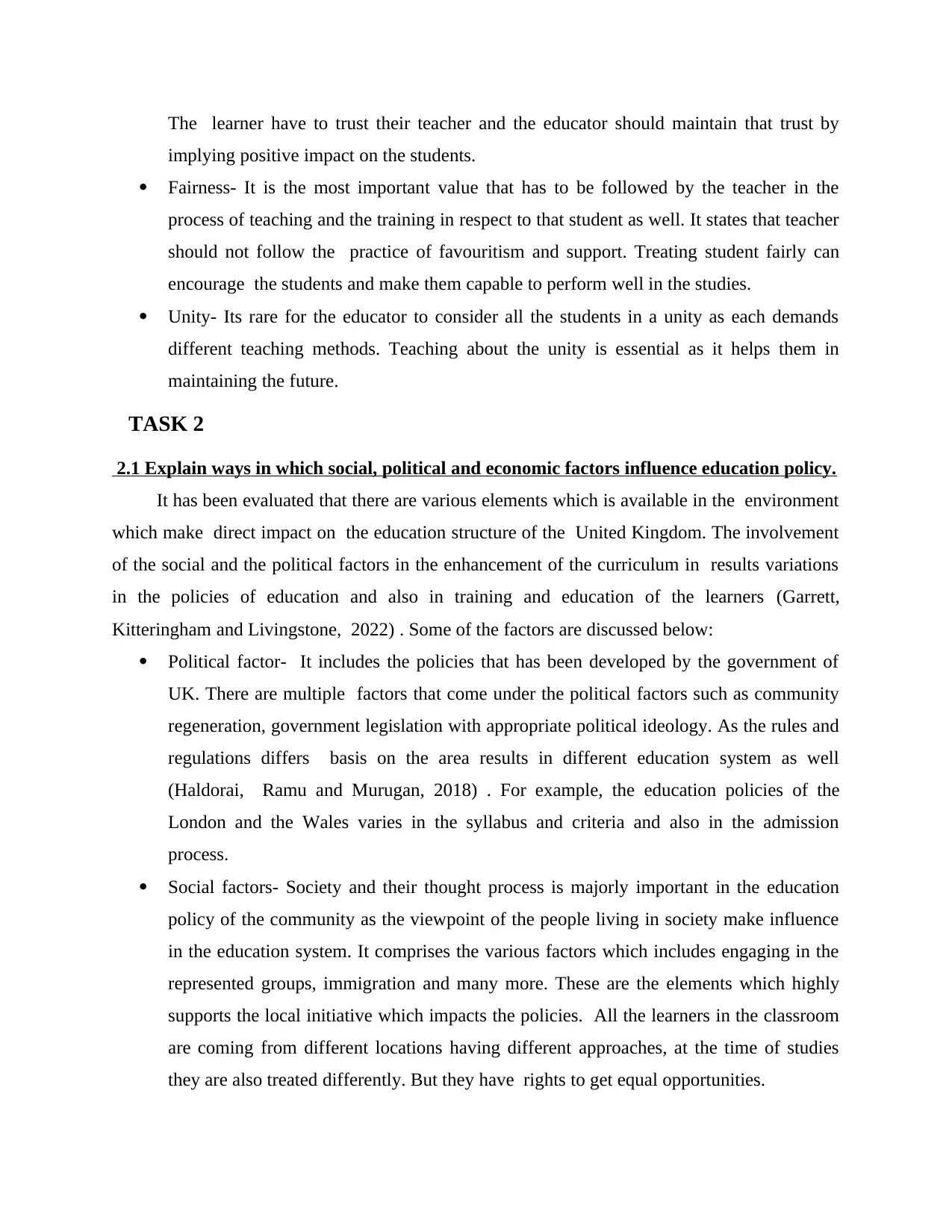
The learner have to trust their teacher and the educator should maintain that trust by
implying positive impact on the students.
Fairness- It is the most important value that has to be followed by the teacher in the
process of teaching and the training in respect to that student as well. It states that teacher
should not follow the practice of favouritism and support. Treating student fairly can
encourage the students and make them capable to perform well in the studies.
Unity- Its rare for the educator to consider all the students in a unity as each demands
different teaching methods. Teaching about the unity is essential as it helps them in
maintaining the future.
TASK 2
2.1 Explain ways in which social, political and economic factors influence education policy.
It has been evaluated that there are various elements which is available in the environment
which make direct impact on the education structure of the United Kingdom. The involvement
of the social and the political factors in the enhancement of the curriculum in results variations
in the policies of education and also in training and education of the learners (Garrett,
Kitteringham and Livingstone, 2022) . Some of the factors are discussed below:
Political factor- It includes the policies that has been developed by the government of
UK. There are multiple factors that come under the political factors such as community
regeneration, government legislation with appropriate political ideology. As the rules and
regulations differs basis on the area results in different education system as well
(Haldorai, Ramu and Murugan, 2018) . For example, the education policies of the
London and the Wales varies in the syllabus and criteria and also in the admission
process.
Social factors- Society and their thought process is majorly important in the education
policy of the community as the viewpoint of the people living in society make influence
in the education system. It comprises the various factors which includes engaging in the
represented groups, immigration and many more. These are the elements which highly
supports the local initiative which impacts the policies. All the learners in the classroom
are coming from different locations having different approaches, at the time of studies
they are also treated differently. But they have rights to get equal opportunities.
implying positive impact on the students.
Fairness- It is the most important value that has to be followed by the teacher in the
process of teaching and the training in respect to that student as well. It states that teacher
should not follow the practice of favouritism and support. Treating student fairly can
encourage the students and make them capable to perform well in the studies.
Unity- Its rare for the educator to consider all the students in a unity as each demands
different teaching methods. Teaching about the unity is essential as it helps them in
maintaining the future.
TASK 2
2.1 Explain ways in which social, political and economic factors influence education policy.
It has been evaluated that there are various elements which is available in the environment
which make direct impact on the education structure of the United Kingdom. The involvement
of the social and the political factors in the enhancement of the curriculum in results variations
in the policies of education and also in training and education of the learners (Garrett,
Kitteringham and Livingstone, 2022) . Some of the factors are discussed below:
Political factor- It includes the policies that has been developed by the government of
UK. There are multiple factors that come under the political factors such as community
regeneration, government legislation with appropriate political ideology. As the rules and
regulations differs basis on the area results in different education system as well
(Haldorai, Ramu and Murugan, 2018) . For example, the education policies of the
London and the Wales varies in the syllabus and criteria and also in the admission
process.
Social factors- Society and their thought process is majorly important in the education
policy of the community as the viewpoint of the people living in society make influence
in the education system. It comprises the various factors which includes engaging in the
represented groups, immigration and many more. These are the elements which highly
supports the local initiative which impacts the policies. All the learners in the classroom
are coming from different locations having different approaches, at the time of studies
they are also treated differently. But they have rights to get equal opportunities.
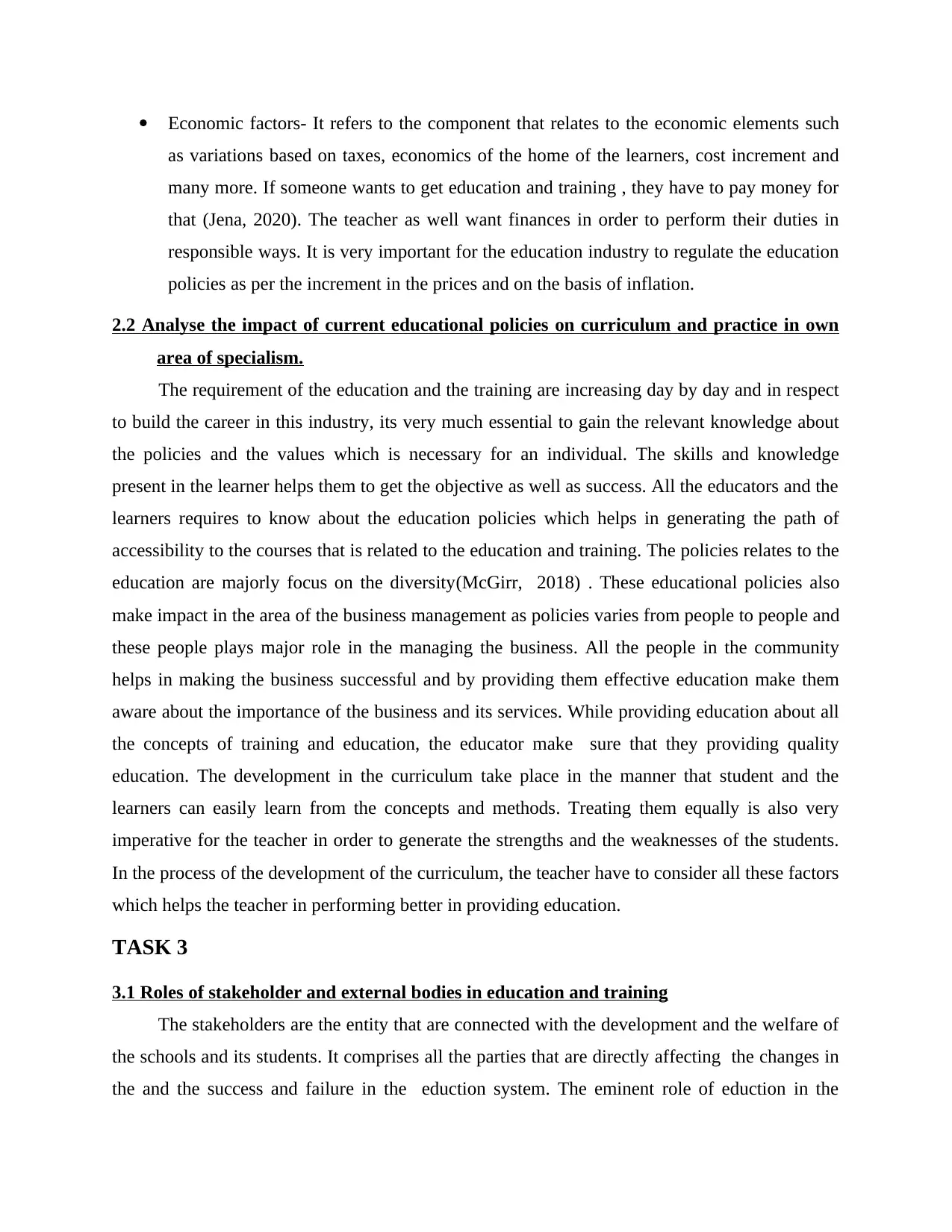
Economic factors- It refers to the component that relates to the economic elements such
as variations based on taxes, economics of the home of the learners, cost increment and
many more. If someone wants to get education and training , they have to pay money for
that (Jena, 2020). The teacher as well want finances in order to perform their duties in
responsible ways. It is very important for the education industry to regulate the education
policies as per the increment in the prices and on the basis of inflation.
2.2 Analyse the impact of current educational policies on curriculum and practice in own
area of specialism.
The requirement of the education and the training are increasing day by day and in respect
to build the career in this industry, its very much essential to gain the relevant knowledge about
the policies and the values which is necessary for an individual. The skills and knowledge
present in the learner helps them to get the objective as well as success. All the educators and the
learners requires to know about the education policies which helps in generating the path of
accessibility to the courses that is related to the education and training. The policies relates to the
education are majorly focus on the diversity(McGirr, 2018) . These educational policies also
make impact in the area of the business management as policies varies from people to people and
these people plays major role in the managing the business. All the people in the community
helps in making the business successful and by providing them effective education make them
aware about the importance of the business and its services. While providing education about all
the concepts of training and education, the educator make sure that they providing quality
education. The development in the curriculum take place in the manner that student and the
learners can easily learn from the concepts and methods. Treating them equally is also very
imperative for the teacher in order to generate the strengths and the weaknesses of the students.
In the process of the development of the curriculum, the teacher have to consider all these factors
which helps the teacher in performing better in providing education.
TASK 3
3.1 Roles of stakeholder and external bodies in education and training
The stakeholders are the entity that are connected with the development and the welfare of
the schools and its students. It comprises all the parties that are directly affecting the changes in
the and the success and failure in the eduction system. The eminent role of eduction in the
as variations based on taxes, economics of the home of the learners, cost increment and
many more. If someone wants to get education and training , they have to pay money for
that (Jena, 2020). The teacher as well want finances in order to perform their duties in
responsible ways. It is very important for the education industry to regulate the education
policies as per the increment in the prices and on the basis of inflation.
2.2 Analyse the impact of current educational policies on curriculum and practice in own
area of specialism.
The requirement of the education and the training are increasing day by day and in respect
to build the career in this industry, its very much essential to gain the relevant knowledge about
the policies and the values which is necessary for an individual. The skills and knowledge
present in the learner helps them to get the objective as well as success. All the educators and the
learners requires to know about the education policies which helps in generating the path of
accessibility to the courses that is related to the education and training. The policies relates to the
education are majorly focus on the diversity(McGirr, 2018) . These educational policies also
make impact in the area of the business management as policies varies from people to people and
these people plays major role in the managing the business. All the people in the community
helps in making the business successful and by providing them effective education make them
aware about the importance of the business and its services. While providing education about all
the concepts of training and education, the educator make sure that they providing quality
education. The development in the curriculum take place in the manner that student and the
learners can easily learn from the concepts and methods. Treating them equally is also very
imperative for the teacher in order to generate the strengths and the weaknesses of the students.
In the process of the development of the curriculum, the teacher have to consider all these factors
which helps the teacher in performing better in providing education.
TASK 3
3.1 Roles of stakeholder and external bodies in education and training
The stakeholders are the entity that are connected with the development and the welfare of
the schools and its students. It comprises all the parties that are directly affecting the changes in
the and the success and failure in the eduction system. The eminent role of eduction in the
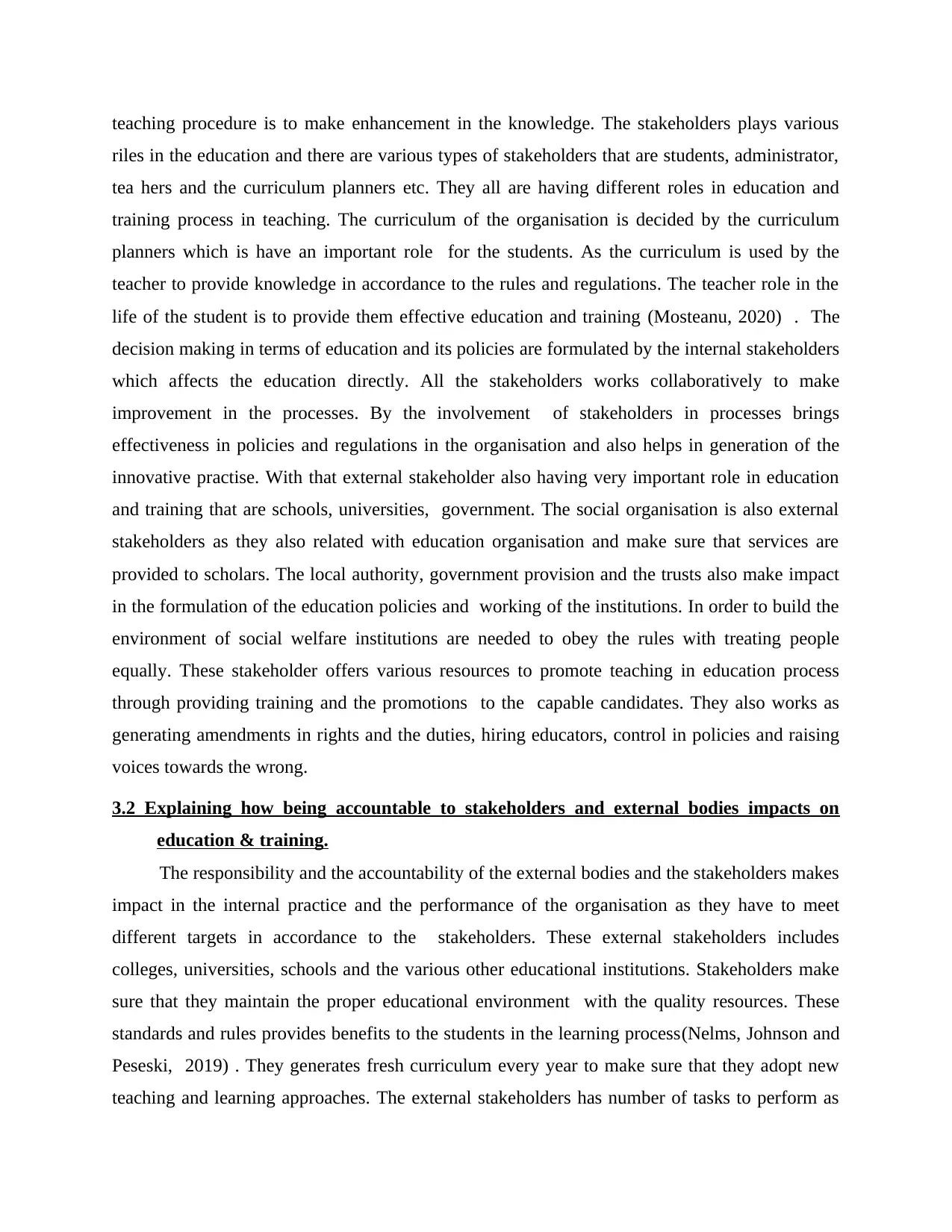
teaching procedure is to make enhancement in the knowledge. The stakeholders plays various
riles in the education and there are various types of stakeholders that are students, administrator,
tea hers and the curriculum planners etc. They all are having different roles in education and
training process in teaching. The curriculum of the organisation is decided by the curriculum
planners which is have an important role for the students. As the curriculum is used by the
teacher to provide knowledge in accordance to the rules and regulations. The teacher role in the
life of the student is to provide them effective education and training (Mosteanu, 2020) . The
decision making in terms of education and its policies are formulated by the internal stakeholders
which affects the education directly. All the stakeholders works collaboratively to make
improvement in the processes. By the involvement of stakeholders in processes brings
effectiveness in policies and regulations in the organisation and also helps in generation of the
innovative practise. With that external stakeholder also having very important role in education
and training that are schools, universities, government. The social organisation is also external
stakeholders as they also related with education organisation and make sure that services are
provided to scholars. The local authority, government provision and the trusts also make impact
in the formulation of the education policies and working of the institutions. In order to build the
environment of social welfare institutions are needed to obey the rules with treating people
equally. These stakeholder offers various resources to promote teaching in education process
through providing training and the promotions to the capable candidates. They also works as
generating amendments in rights and the duties, hiring educators, control in policies and raising
voices towards the wrong.
3.2 Explaining how being accountable to stakeholders and external bodies impacts on
education & training.
The responsibility and the accountability of the external bodies and the stakeholders makes
impact in the internal practice and the performance of the organisation as they have to meet
different targets in accordance to the stakeholders. These external stakeholders includes
colleges, universities, schools and the various other educational institutions. Stakeholders make
sure that they maintain the proper educational environment with the quality resources. These
standards and rules provides benefits to the students in the learning process(Nelms, Johnson and
Peseski, 2019) . They generates fresh curriculum every year to make sure that they adopt new
teaching and learning approaches. The external stakeholders has number of tasks to perform as
riles in the education and there are various types of stakeholders that are students, administrator,
tea hers and the curriculum planners etc. They all are having different roles in education and
training process in teaching. The curriculum of the organisation is decided by the curriculum
planners which is have an important role for the students. As the curriculum is used by the
teacher to provide knowledge in accordance to the rules and regulations. The teacher role in the
life of the student is to provide them effective education and training (Mosteanu, 2020) . The
decision making in terms of education and its policies are formulated by the internal stakeholders
which affects the education directly. All the stakeholders works collaboratively to make
improvement in the processes. By the involvement of stakeholders in processes brings
effectiveness in policies and regulations in the organisation and also helps in generation of the
innovative practise. With that external stakeholder also having very important role in education
and training that are schools, universities, government. The social organisation is also external
stakeholders as they also related with education organisation and make sure that services are
provided to scholars. The local authority, government provision and the trusts also make impact
in the formulation of the education policies and working of the institutions. In order to build the
environment of social welfare institutions are needed to obey the rules with treating people
equally. These stakeholder offers various resources to promote teaching in education process
through providing training and the promotions to the capable candidates. They also works as
generating amendments in rights and the duties, hiring educators, control in policies and raising
voices towards the wrong.
3.2 Explaining how being accountable to stakeholders and external bodies impacts on
education & training.
The responsibility and the accountability of the external bodies and the stakeholders makes
impact in the internal practice and the performance of the organisation as they have to meet
different targets in accordance to the stakeholders. These external stakeholders includes
colleges, universities, schools and the various other educational institutions. Stakeholders make
sure that they maintain the proper educational environment with the quality resources. These
standards and rules provides benefits to the students in the learning process(Nelms, Johnson and
Peseski, 2019) . They generates fresh curriculum every year to make sure that they adopt new
teaching and learning approaches. The external stakeholders has number of tasks to perform as
Paraphrase This Document
Need a fresh take? Get an instant paraphrase of this document with our AI Paraphraser
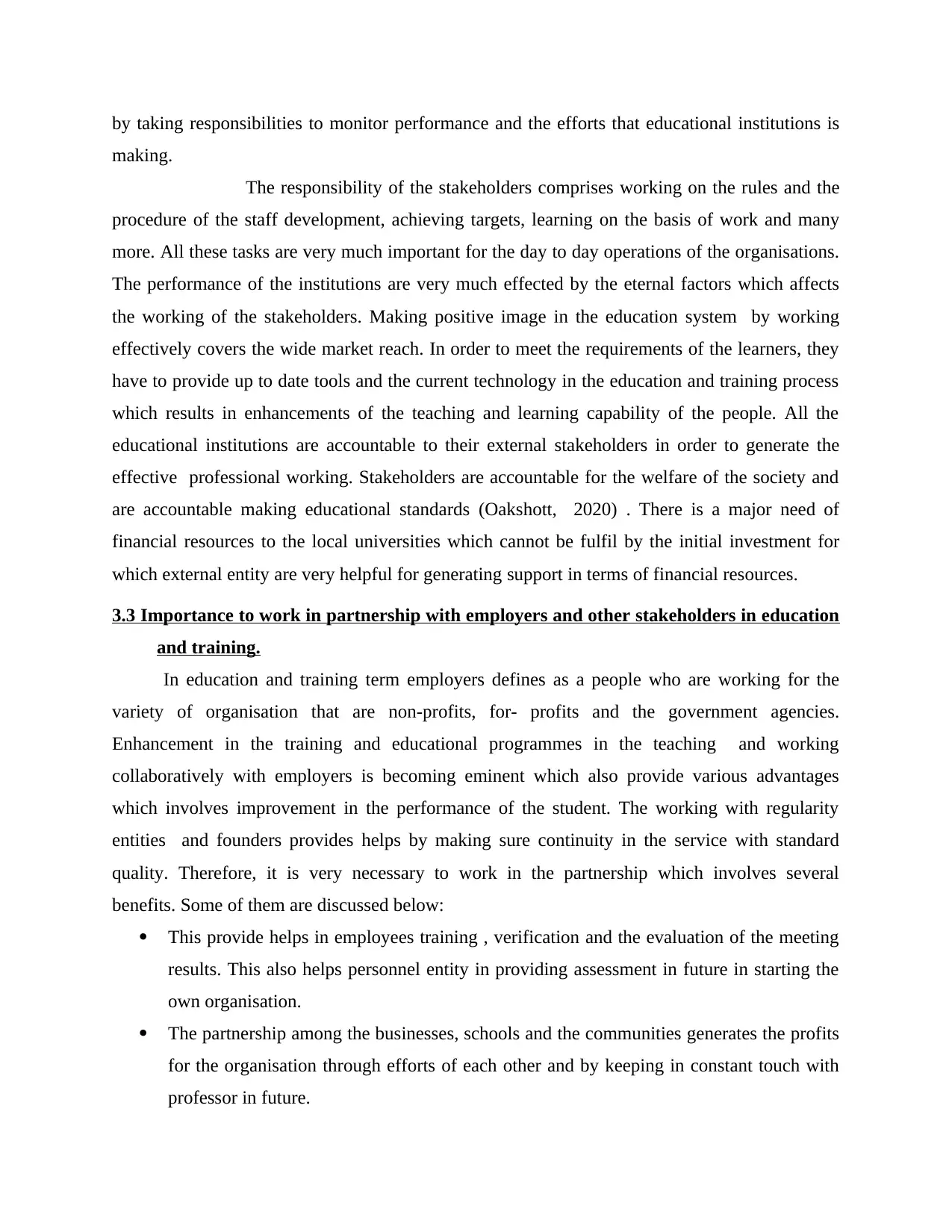
by taking responsibilities to monitor performance and the efforts that educational institutions is
making.
The responsibility of the stakeholders comprises working on the rules and the
procedure of the staff development, achieving targets, learning on the basis of work and many
more. All these tasks are very much important for the day to day operations of the organisations.
The performance of the institutions are very much effected by the eternal factors which affects
the working of the stakeholders. Making positive image in the education system by working
effectively covers the wide market reach. In order to meet the requirements of the learners, they
have to provide up to date tools and the current technology in the education and training process
which results in enhancements of the teaching and learning capability of the people. All the
educational institutions are accountable to their external stakeholders in order to generate the
effective professional working. Stakeholders are accountable for the welfare of the society and
are accountable making educational standards (Oakshott, 2020) . There is a major need of
financial resources to the local universities which cannot be fulfil by the initial investment for
which external entity are very helpful for generating support in terms of financial resources.
3.3 Importance to work in partnership with employers and other stakeholders in education
and training.
In education and training term employers defines as a people who are working for the
variety of organisation that are non-profits, for- profits and the government agencies.
Enhancement in the training and educational programmes in the teaching and working
collaboratively with employers is becoming eminent which also provide various advantages
which involves improvement in the performance of the student. The working with regularity
entities and founders provides helps by making sure continuity in the service with standard
quality. Therefore, it is very necessary to work in the partnership which involves several
benefits. Some of them are discussed below:
This provide helps in employees training , verification and the evaluation of the meeting
results. This also helps personnel entity in providing assessment in future in starting the
own organisation.
The partnership among the businesses, schools and the communities generates the profits
for the organisation through efforts of each other and by keeping in constant touch with
professor in future.
making.
The responsibility of the stakeholders comprises working on the rules and the
procedure of the staff development, achieving targets, learning on the basis of work and many
more. All these tasks are very much important for the day to day operations of the organisations.
The performance of the institutions are very much effected by the eternal factors which affects
the working of the stakeholders. Making positive image in the education system by working
effectively covers the wide market reach. In order to meet the requirements of the learners, they
have to provide up to date tools and the current technology in the education and training process
which results in enhancements of the teaching and learning capability of the people. All the
educational institutions are accountable to their external stakeholders in order to generate the
effective professional working. Stakeholders are accountable for the welfare of the society and
are accountable making educational standards (Oakshott, 2020) . There is a major need of
financial resources to the local universities which cannot be fulfil by the initial investment for
which external entity are very helpful for generating support in terms of financial resources.
3.3 Importance to work in partnership with employers and other stakeholders in education
and training.
In education and training term employers defines as a people who are working for the
variety of organisation that are non-profits, for- profits and the government agencies.
Enhancement in the training and educational programmes in the teaching and working
collaboratively with employers is becoming eminent which also provide various advantages
which involves improvement in the performance of the student. The working with regularity
entities and founders provides helps by making sure continuity in the service with standard
quality. Therefore, it is very necessary to work in the partnership which involves several
benefits. Some of them are discussed below:
This provide helps in employees training , verification and the evaluation of the meeting
results. This also helps personnel entity in providing assessment in future in starting the
own organisation.
The partnership among the businesses, schools and the communities generates the profits
for the organisation through efforts of each other and by keeping in constant touch with
professor in future.
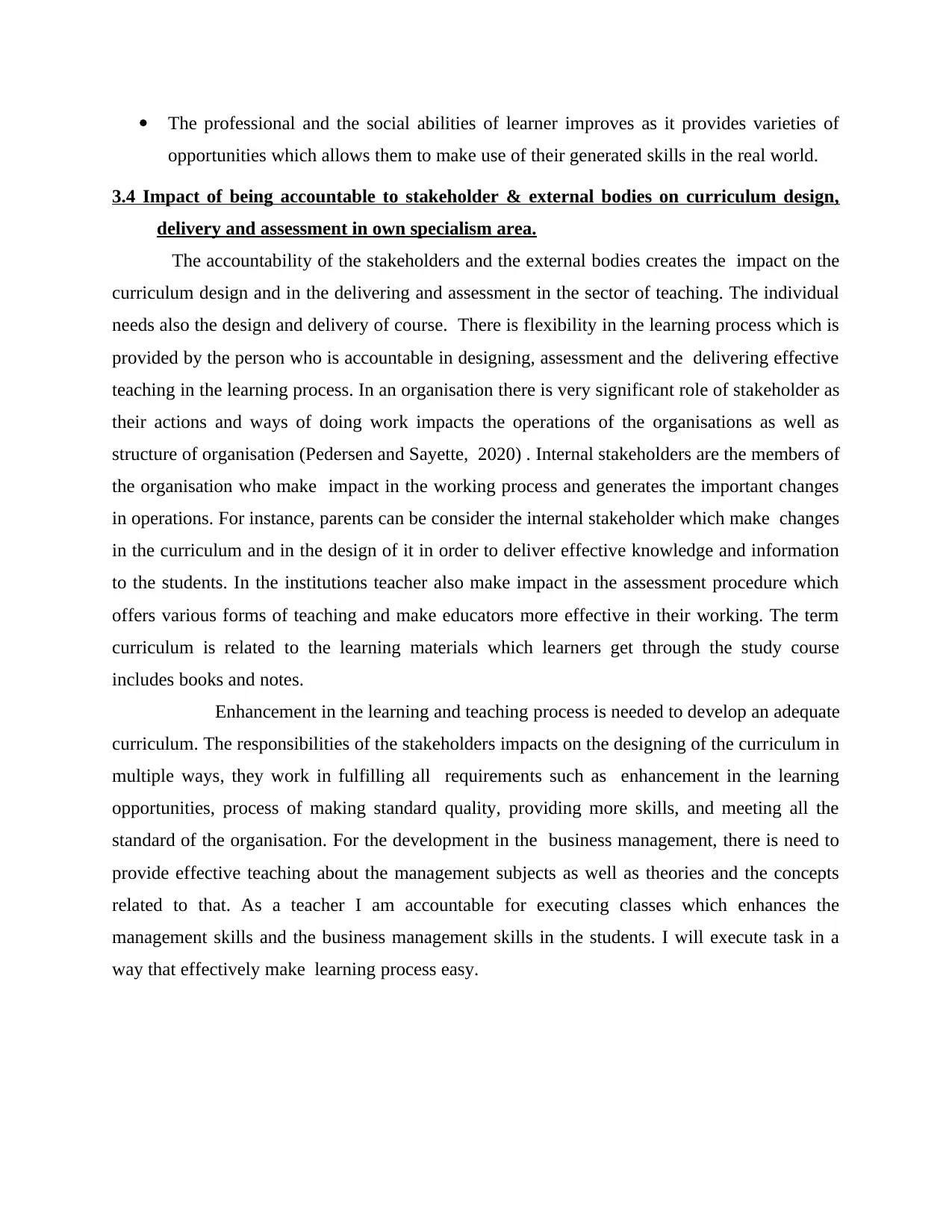
The professional and the social abilities of learner improves as it provides varieties of
opportunities which allows them to make use of their generated skills in the real world.
3.4 Impact of being accountable to stakeholder & external bodies on curriculum design,
delivery and assessment in own specialism area.
The accountability of the stakeholders and the external bodies creates the impact on the
curriculum design and in the delivering and assessment in the sector of teaching. The individual
needs also the design and delivery of course. There is flexibility in the learning process which is
provided by the person who is accountable in designing, assessment and the delivering effective
teaching in the learning process. In an organisation there is very significant role of stakeholder as
their actions and ways of doing work impacts the operations of the organisations as well as
structure of organisation (Pedersen and Sayette, 2020) . Internal stakeholders are the members of
the organisation who make impact in the working process and generates the important changes
in operations. For instance, parents can be consider the internal stakeholder which make changes
in the curriculum and in the design of it in order to deliver effective knowledge and information
to the students. In the institutions teacher also make impact in the assessment procedure which
offers various forms of teaching and make educators more effective in their working. The term
curriculum is related to the learning materials which learners get through the study course
includes books and notes.
Enhancement in the learning and teaching process is needed to develop an adequate
curriculum. The responsibilities of the stakeholders impacts on the designing of the curriculum in
multiple ways, they work in fulfilling all requirements such as enhancement in the learning
opportunities, process of making standard quality, providing more skills, and meeting all the
standard of the organisation. For the development in the business management, there is need to
provide effective teaching about the management subjects as well as theories and the concepts
related to that. As a teacher I am accountable for executing classes which enhances the
management skills and the business management skills in the students. I will execute task in a
way that effectively make learning process easy.
opportunities which allows them to make use of their generated skills in the real world.
3.4 Impact of being accountable to stakeholder & external bodies on curriculum design,
delivery and assessment in own specialism area.
The accountability of the stakeholders and the external bodies creates the impact on the
curriculum design and in the delivering and assessment in the sector of teaching. The individual
needs also the design and delivery of course. There is flexibility in the learning process which is
provided by the person who is accountable in designing, assessment and the delivering effective
teaching in the learning process. In an organisation there is very significant role of stakeholder as
their actions and ways of doing work impacts the operations of the organisations as well as
structure of organisation (Pedersen and Sayette, 2020) . Internal stakeholders are the members of
the organisation who make impact in the working process and generates the important changes
in operations. For instance, parents can be consider the internal stakeholder which make changes
in the curriculum and in the design of it in order to deliver effective knowledge and information
to the students. In the institutions teacher also make impact in the assessment procedure which
offers various forms of teaching and make educators more effective in their working. The term
curriculum is related to the learning materials which learners get through the study course
includes books and notes.
Enhancement in the learning and teaching process is needed to develop an adequate
curriculum. The responsibilities of the stakeholders impacts on the designing of the curriculum in
multiple ways, they work in fulfilling all requirements such as enhancement in the learning
opportunities, process of making standard quality, providing more skills, and meeting all the
standard of the organisation. For the development in the business management, there is need to
provide effective teaching about the management subjects as well as theories and the concepts
related to that. As a teacher I am accountable for executing classes which enhances the
management skills and the business management skills in the students. I will execute task in a
way that effectively make learning process easy.
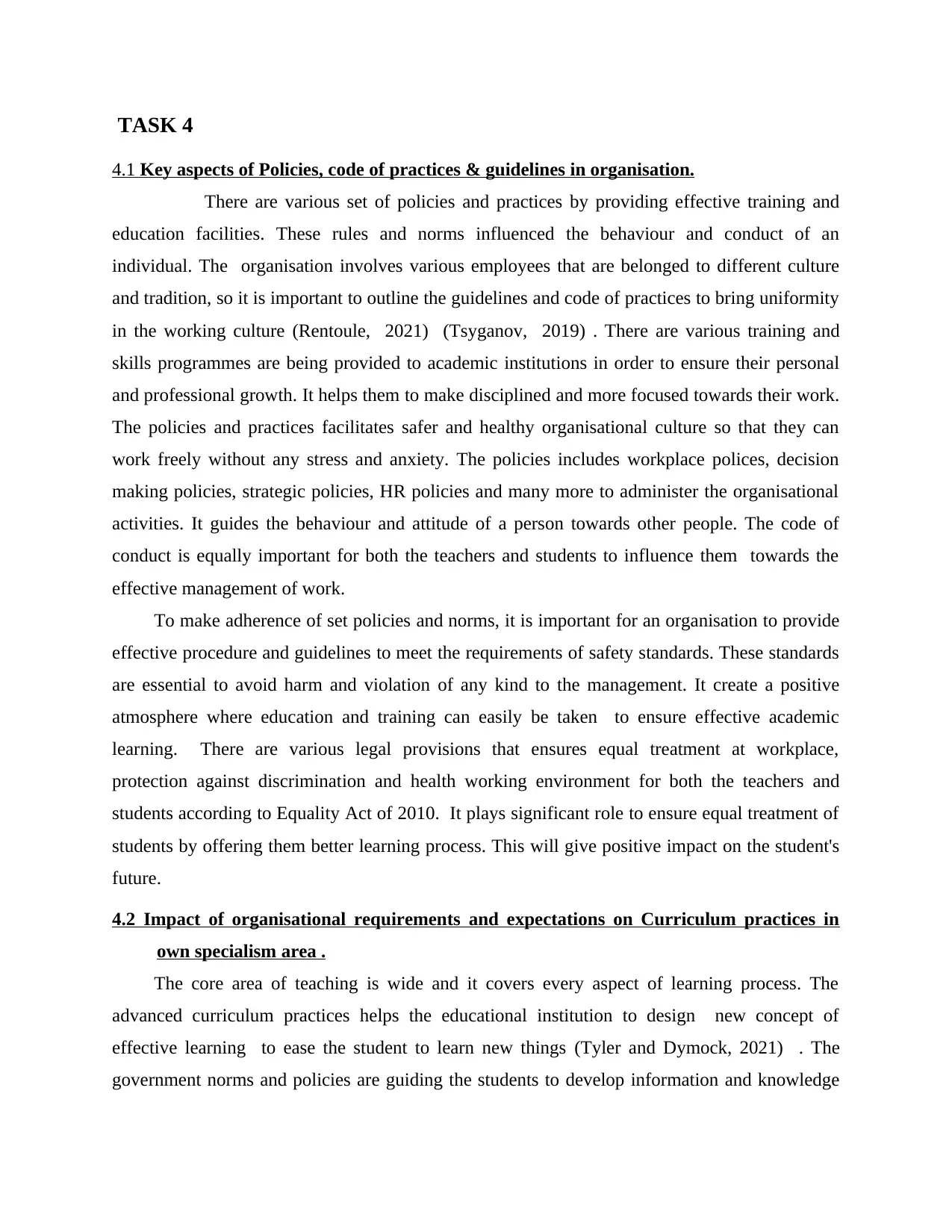
TASK 4
4.1 Key aspects of Policies, code of practices & guidelines in organisation.
There are various set of policies and practices by providing effective training and
education facilities. These rules and norms influenced the behaviour and conduct of an
individual. The organisation involves various employees that are belonged to different culture
and tradition, so it is important to outline the guidelines and code of practices to bring uniformity
in the working culture (Rentoule, 2021) (Tsyganov, 2019) . There are various training and
skills programmes are being provided to academic institutions in order to ensure their personal
and professional growth. It helps them to make disciplined and more focused towards their work.
The policies and practices facilitates safer and healthy organisational culture so that they can
work freely without any stress and anxiety. The policies includes workplace polices, decision
making policies, strategic policies, HR policies and many more to administer the organisational
activities. It guides the behaviour and attitude of a person towards other people. The code of
conduct is equally important for both the teachers and students to influence them towards the
effective management of work.
To make adherence of set policies and norms, it is important for an organisation to provide
effective procedure and guidelines to meet the requirements of safety standards. These standards
are essential to avoid harm and violation of any kind to the management. It create a positive
atmosphere where education and training can easily be taken to ensure effective academic
learning. There are various legal provisions that ensures equal treatment at workplace,
protection against discrimination and health working environment for both the teachers and
students according to Equality Act of 2010. It plays significant role to ensure equal treatment of
students by offering them better learning process. This will give positive impact on the student's
future.
4.2 Impact of organisational requirements and expectations on Curriculum practices in
own specialism area .
The core area of teaching is wide and it covers every aspect of learning process. The
advanced curriculum practices helps the educational institution to design new concept of
effective learning to ease the student to learn new things (Tyler and Dymock, 2021) . The
government norms and policies are guiding the students to develop information and knowledge
4.1 Key aspects of Policies, code of practices & guidelines in organisation.
There are various set of policies and practices by providing effective training and
education facilities. These rules and norms influenced the behaviour and conduct of an
individual. The organisation involves various employees that are belonged to different culture
and tradition, so it is important to outline the guidelines and code of practices to bring uniformity
in the working culture (Rentoule, 2021) (Tsyganov, 2019) . There are various training and
skills programmes are being provided to academic institutions in order to ensure their personal
and professional growth. It helps them to make disciplined and more focused towards their work.
The policies and practices facilitates safer and healthy organisational culture so that they can
work freely without any stress and anxiety. The policies includes workplace polices, decision
making policies, strategic policies, HR policies and many more to administer the organisational
activities. It guides the behaviour and attitude of a person towards other people. The code of
conduct is equally important for both the teachers and students to influence them towards the
effective management of work.
To make adherence of set policies and norms, it is important for an organisation to provide
effective procedure and guidelines to meet the requirements of safety standards. These standards
are essential to avoid harm and violation of any kind to the management. It create a positive
atmosphere where education and training can easily be taken to ensure effective academic
learning. There are various legal provisions that ensures equal treatment at workplace,
protection against discrimination and health working environment for both the teachers and
students according to Equality Act of 2010. It plays significant role to ensure equal treatment of
students by offering them better learning process. This will give positive impact on the student's
future.
4.2 Impact of organisational requirements and expectations on Curriculum practices in
own specialism area .
The core area of teaching is wide and it covers every aspect of learning process. The
advanced curriculum practices helps the educational institution to design new concept of
effective learning to ease the student to learn new things (Tyler and Dymock, 2021) . The
government norms and policies are guiding the students to develop information and knowledge
Secure Best Marks with AI Grader
Need help grading? Try our AI Grader for instant feedback on your assignments.
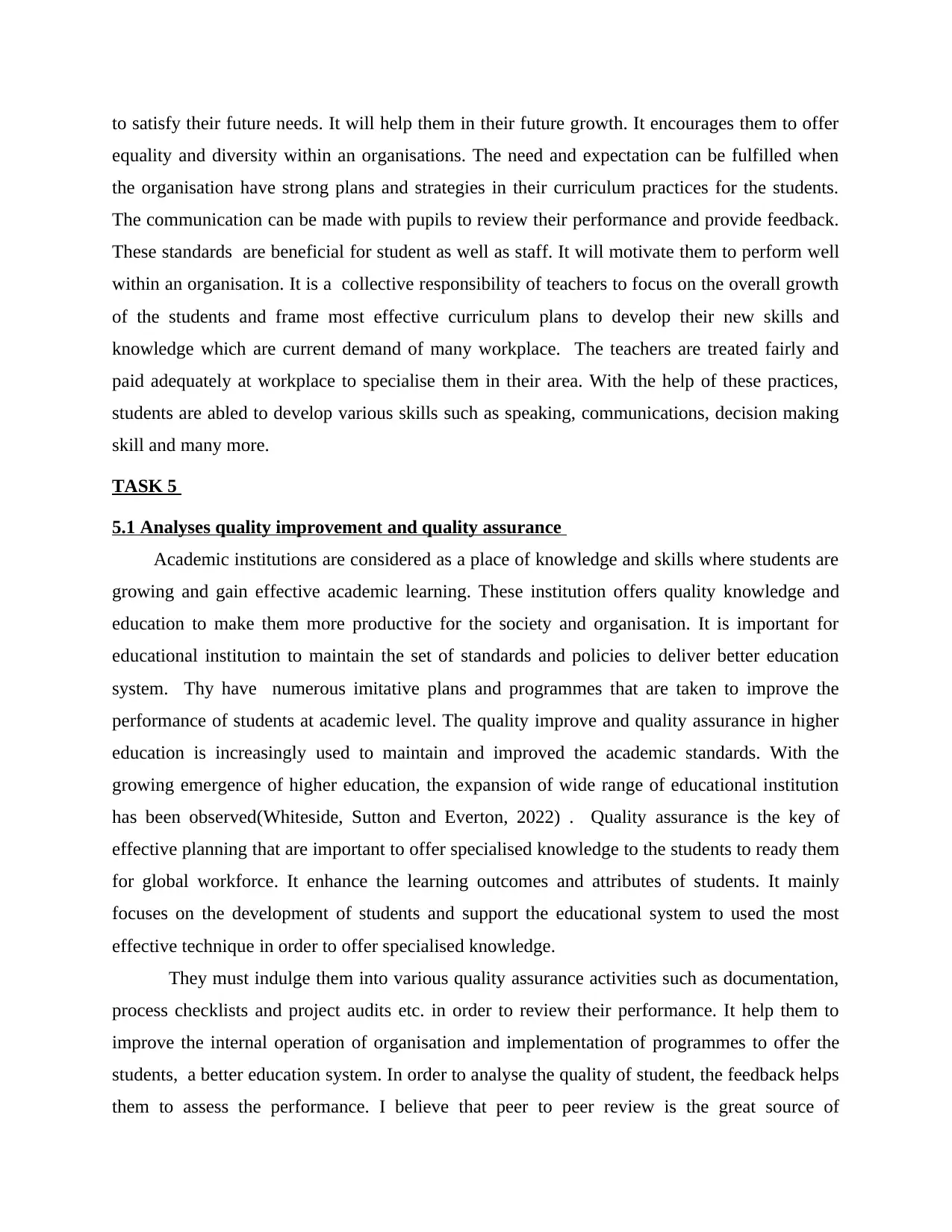
to satisfy their future needs. It will help them in their future growth. It encourages them to offer
equality and diversity within an organisations. The need and expectation can be fulfilled when
the organisation have strong plans and strategies in their curriculum practices for the students.
The communication can be made with pupils to review their performance and provide feedback.
These standards are beneficial for student as well as staff. It will motivate them to perform well
within an organisation. It is a collective responsibility of teachers to focus on the overall growth
of the students and frame most effective curriculum plans to develop their new skills and
knowledge which are current demand of many workplace. The teachers are treated fairly and
paid adequately at workplace to specialise them in their area. With the help of these practices,
students are abled to develop various skills such as speaking, communications, decision making
skill and many more.
TASK 5
5.1 Analyses quality improvement and quality assurance
Academic institutions are considered as a place of knowledge and skills where students are
growing and gain effective academic learning. These institution offers quality knowledge and
education to make them more productive for the society and organisation. It is important for
educational institution to maintain the set of standards and policies to deliver better education
system. Thy have numerous imitative plans and programmes that are taken to improve the
performance of students at academic level. The quality improve and quality assurance in higher
education is increasingly used to maintain and improved the academic standards. With the
growing emergence of higher education, the expansion of wide range of educational institution
has been observed(Whiteside, Sutton and Everton, 2022) . Quality assurance is the key of
effective planning that are important to offer specialised knowledge to the students to ready them
for global workforce. It enhance the learning outcomes and attributes of students. It mainly
focuses on the development of students and support the educational system to used the most
effective technique in order to offer specialised knowledge.
They must indulge them into various quality assurance activities such as documentation,
process checklists and project audits etc. in order to review their performance. It help them to
improve the internal operation of organisation and implementation of programmes to offer the
students, a better education system. In order to analyse the quality of student, the feedback helps
them to assess the performance. I believe that peer to peer review is the great source of
equality and diversity within an organisations. The need and expectation can be fulfilled when
the organisation have strong plans and strategies in their curriculum practices for the students.
The communication can be made with pupils to review their performance and provide feedback.
These standards are beneficial for student as well as staff. It will motivate them to perform well
within an organisation. It is a collective responsibility of teachers to focus on the overall growth
of the students and frame most effective curriculum plans to develop their new skills and
knowledge which are current demand of many workplace. The teachers are treated fairly and
paid adequately at workplace to specialise them in their area. With the help of these practices,
students are abled to develop various skills such as speaking, communications, decision making
skill and many more.
TASK 5
5.1 Analyses quality improvement and quality assurance
Academic institutions are considered as a place of knowledge and skills where students are
growing and gain effective academic learning. These institution offers quality knowledge and
education to make them more productive for the society and organisation. It is important for
educational institution to maintain the set of standards and policies to deliver better education
system. Thy have numerous imitative plans and programmes that are taken to improve the
performance of students at academic level. The quality improve and quality assurance in higher
education is increasingly used to maintain and improved the academic standards. With the
growing emergence of higher education, the expansion of wide range of educational institution
has been observed(Whiteside, Sutton and Everton, 2022) . Quality assurance is the key of
effective planning that are important to offer specialised knowledge to the students to ready them
for global workforce. It enhance the learning outcomes and attributes of students. It mainly
focuses on the development of students and support the educational system to used the most
effective technique in order to offer specialised knowledge.
They must indulge them into various quality assurance activities such as documentation,
process checklists and project audits etc. in order to review their performance. It help them to
improve the internal operation of organisation and implementation of programmes to offer the
students, a better education system. In order to analyse the quality of student, the feedback helps
them to assess the performance. I believe that peer to peer review is the great source of
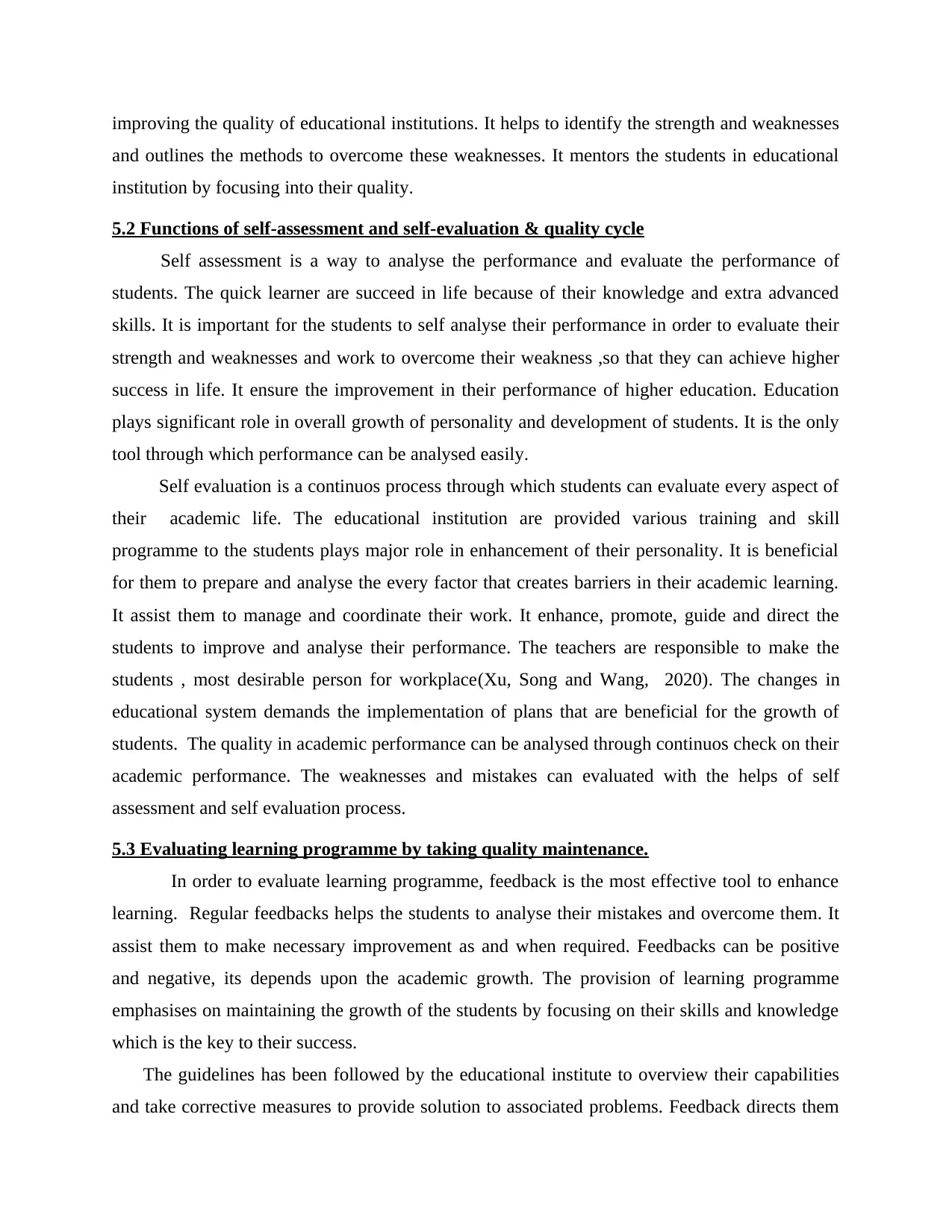
improving the quality of educational institutions. It helps to identify the strength and weaknesses
and outlines the methods to overcome these weaknesses. It mentors the students in educational
institution by focusing into their quality.
5.2 Functions of self-assessment and self-evaluation & quality cycle
Self assessment is a way to analyse the performance and evaluate the performance of
students. The quick learner are succeed in life because of their knowledge and extra advanced
skills. It is important for the students to self analyse their performance in order to evaluate their
strength and weaknesses and work to overcome their weakness ,so that they can achieve higher
success in life. It ensure the improvement in their performance of higher education. Education
plays significant role in overall growth of personality and development of students. It is the only
tool through which performance can be analysed easily.
Self evaluation is a continuos process through which students can evaluate every aspect of
their academic life. The educational institution are provided various training and skill
programme to the students plays major role in enhancement of their personality. It is beneficial
for them to prepare and analyse the every factor that creates barriers in their academic learning.
It assist them to manage and coordinate their work. It enhance, promote, guide and direct the
students to improve and analyse their performance. The teachers are responsible to make the
students , most desirable person for workplace(Xu, Song and Wang, 2020). The changes in
educational system demands the implementation of plans that are beneficial for the growth of
students. The quality in academic performance can be analysed through continuos check on their
academic performance. The weaknesses and mistakes can evaluated with the helps of self
assessment and self evaluation process.
5.3 Evaluating learning programme by taking quality maintenance.
In order to evaluate learning programme, feedback is the most effective tool to enhance
learning. Regular feedbacks helps the students to analyse their mistakes and overcome them. It
assist them to make necessary improvement as and when required. Feedbacks can be positive
and negative, its depends upon the academic growth. The provision of learning programme
emphasises on maintaining the growth of the students by focusing on their skills and knowledge
which is the key to their success.
The guidelines has been followed by the educational institute to overview their capabilities
and take corrective measures to provide solution to associated problems. Feedback directs them
and outlines the methods to overcome these weaknesses. It mentors the students in educational
institution by focusing into their quality.
5.2 Functions of self-assessment and self-evaluation & quality cycle
Self assessment is a way to analyse the performance and evaluate the performance of
students. The quick learner are succeed in life because of their knowledge and extra advanced
skills. It is important for the students to self analyse their performance in order to evaluate their
strength and weaknesses and work to overcome their weakness ,so that they can achieve higher
success in life. It ensure the improvement in their performance of higher education. Education
plays significant role in overall growth of personality and development of students. It is the only
tool through which performance can be analysed easily.
Self evaluation is a continuos process through which students can evaluate every aspect of
their academic life. The educational institution are provided various training and skill
programme to the students plays major role in enhancement of their personality. It is beneficial
for them to prepare and analyse the every factor that creates barriers in their academic learning.
It assist them to manage and coordinate their work. It enhance, promote, guide and direct the
students to improve and analyse their performance. The teachers are responsible to make the
students , most desirable person for workplace(Xu, Song and Wang, 2020). The changes in
educational system demands the implementation of plans that are beneficial for the growth of
students. The quality in academic performance can be analysed through continuos check on their
academic performance. The weaknesses and mistakes can evaluated with the helps of self
assessment and self evaluation process.
5.3 Evaluating learning programme by taking quality maintenance.
In order to evaluate learning programme, feedback is the most effective tool to enhance
learning. Regular feedbacks helps the students to analyse their mistakes and overcome them. It
assist them to make necessary improvement as and when required. Feedbacks can be positive
and negative, its depends upon the academic growth. The provision of learning programme
emphasises on maintaining the growth of the students by focusing on their skills and knowledge
which is the key to their success.
The guidelines has been followed by the educational institute to overview their capabilities
and take corrective measures to provide solution to associated problems. Feedback directs them
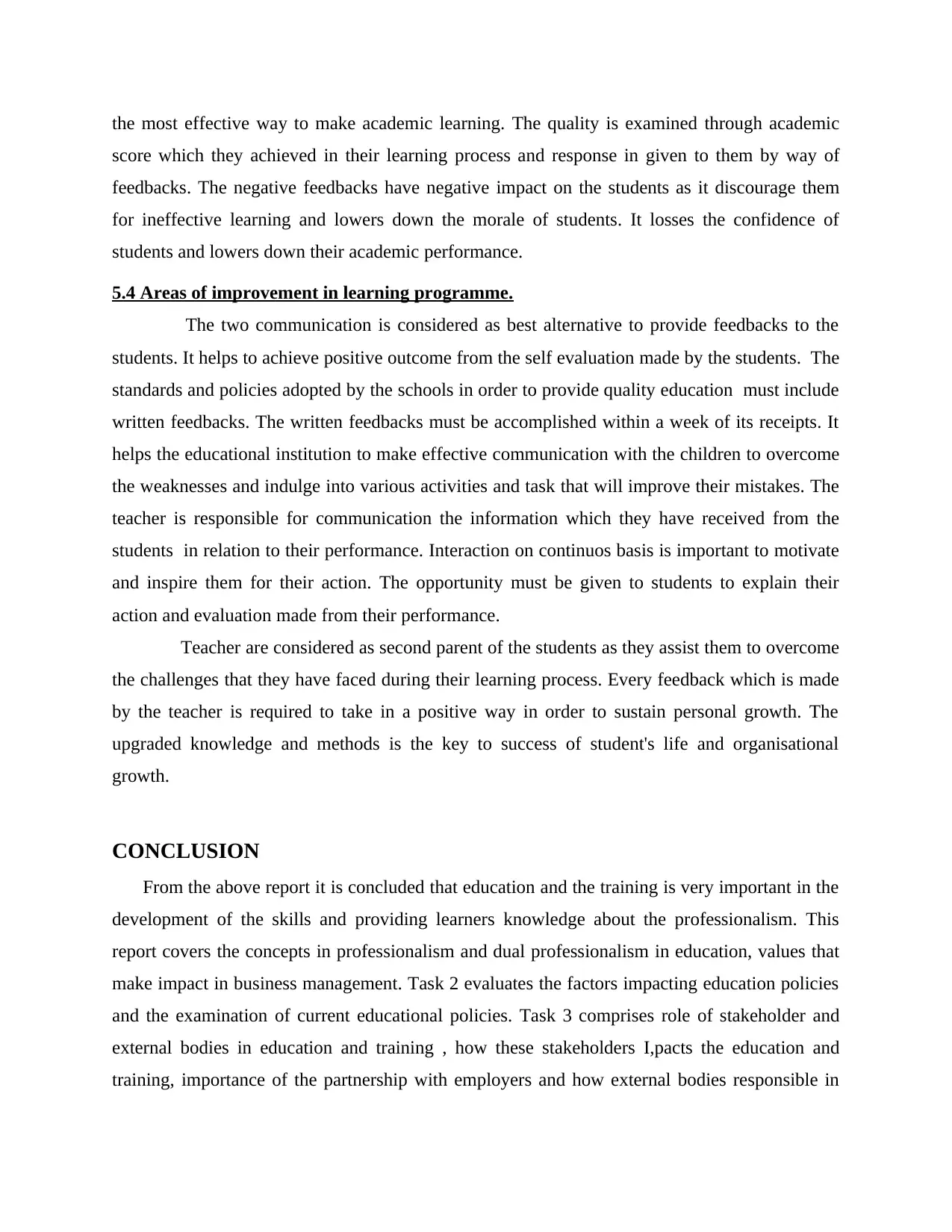
the most effective way to make academic learning. The quality is examined through academic
score which they achieved in their learning process and response in given to them by way of
feedbacks. The negative feedbacks have negative impact on the students as it discourage them
for ineffective learning and lowers down the morale of students. It losses the confidence of
students and lowers down their academic performance.
5.4 Areas of improvement in learning programme.
The two communication is considered as best alternative to provide feedbacks to the
students. It helps to achieve positive outcome from the self evaluation made by the students. The
standards and policies adopted by the schools in order to provide quality education must include
written feedbacks. The written feedbacks must be accomplished within a week of its receipts. It
helps the educational institution to make effective communication with the children to overcome
the weaknesses and indulge into various activities and task that will improve their mistakes. The
teacher is responsible for communication the information which they have received from the
students in relation to their performance. Interaction on continuos basis is important to motivate
and inspire them for their action. The opportunity must be given to students to explain their
action and evaluation made from their performance.
Teacher are considered as second parent of the students as they assist them to overcome
the challenges that they have faced during their learning process. Every feedback which is made
by the teacher is required to take in a positive way in order to sustain personal growth. The
upgraded knowledge and methods is the key to success of student's life and organisational
growth.
CONCLUSION
From the above report it is concluded that education and the training is very important in the
development of the skills and providing learners knowledge about the professionalism. This
report covers the concepts in professionalism and dual professionalism in education, values that
make impact in business management. Task 2 evaluates the factors impacting education policies
and the examination of current educational policies. Task 3 comprises role of stakeholder and
external bodies in education and training , how these stakeholders I,pacts the education and
training, importance of the partnership with employers and how external bodies responsible in
score which they achieved in their learning process and response in given to them by way of
feedbacks. The negative feedbacks have negative impact on the students as it discourage them
for ineffective learning and lowers down the morale of students. It losses the confidence of
students and lowers down their academic performance.
5.4 Areas of improvement in learning programme.
The two communication is considered as best alternative to provide feedbacks to the
students. It helps to achieve positive outcome from the self evaluation made by the students. The
standards and policies adopted by the schools in order to provide quality education must include
written feedbacks. The written feedbacks must be accomplished within a week of its receipts. It
helps the educational institution to make effective communication with the children to overcome
the weaknesses and indulge into various activities and task that will improve their mistakes. The
teacher is responsible for communication the information which they have received from the
students in relation to their performance. Interaction on continuos basis is important to motivate
and inspire them for their action. The opportunity must be given to students to explain their
action and evaluation made from their performance.
Teacher are considered as second parent of the students as they assist them to overcome
the challenges that they have faced during their learning process. Every feedback which is made
by the teacher is required to take in a positive way in order to sustain personal growth. The
upgraded knowledge and methods is the key to success of student's life and organisational
growth.
CONCLUSION
From the above report it is concluded that education and the training is very important in the
development of the skills and providing learners knowledge about the professionalism. This
report covers the concepts in professionalism and dual professionalism in education, values that
make impact in business management. Task 2 evaluates the factors impacting education policies
and the examination of current educational policies. Task 3 comprises role of stakeholder and
external bodies in education and training , how these stakeholders I,pacts the education and
training, importance of the partnership with employers and how external bodies responsible in
Paraphrase This Document
Need a fresh take? Get an instant paraphrase of this document with our AI Paraphraser
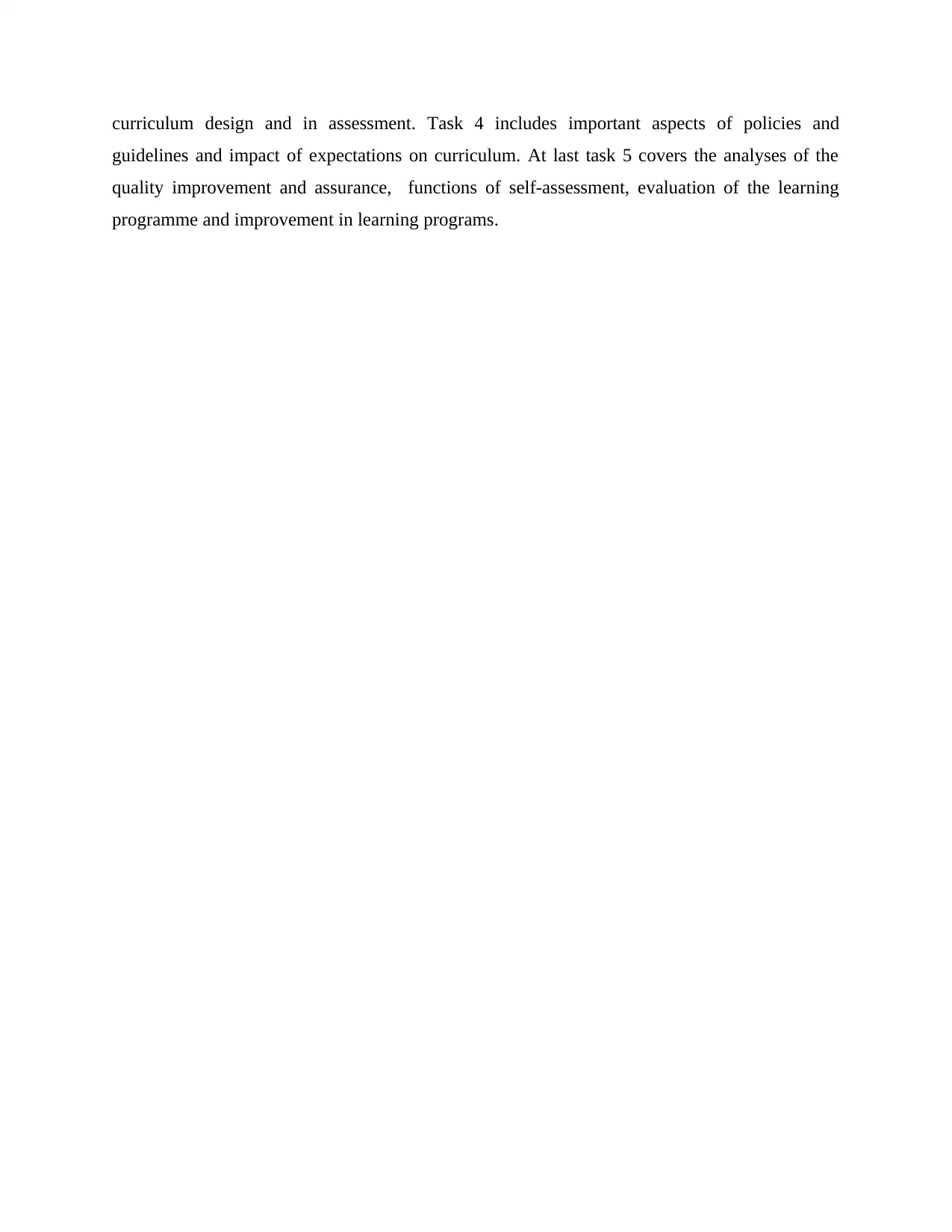
curriculum design and in assessment. Task 4 includes important aspects of policies and
guidelines and impact of expectations on curriculum. At last task 5 covers the analyses of the
quality improvement and assurance, functions of self-assessment, evaluation of the learning
programme and improvement in learning programs.
guidelines and impact of expectations on curriculum. At last task 5 covers the analyses of the
quality improvement and assurance, functions of self-assessment, evaluation of the learning
programme and improvement in learning programs.
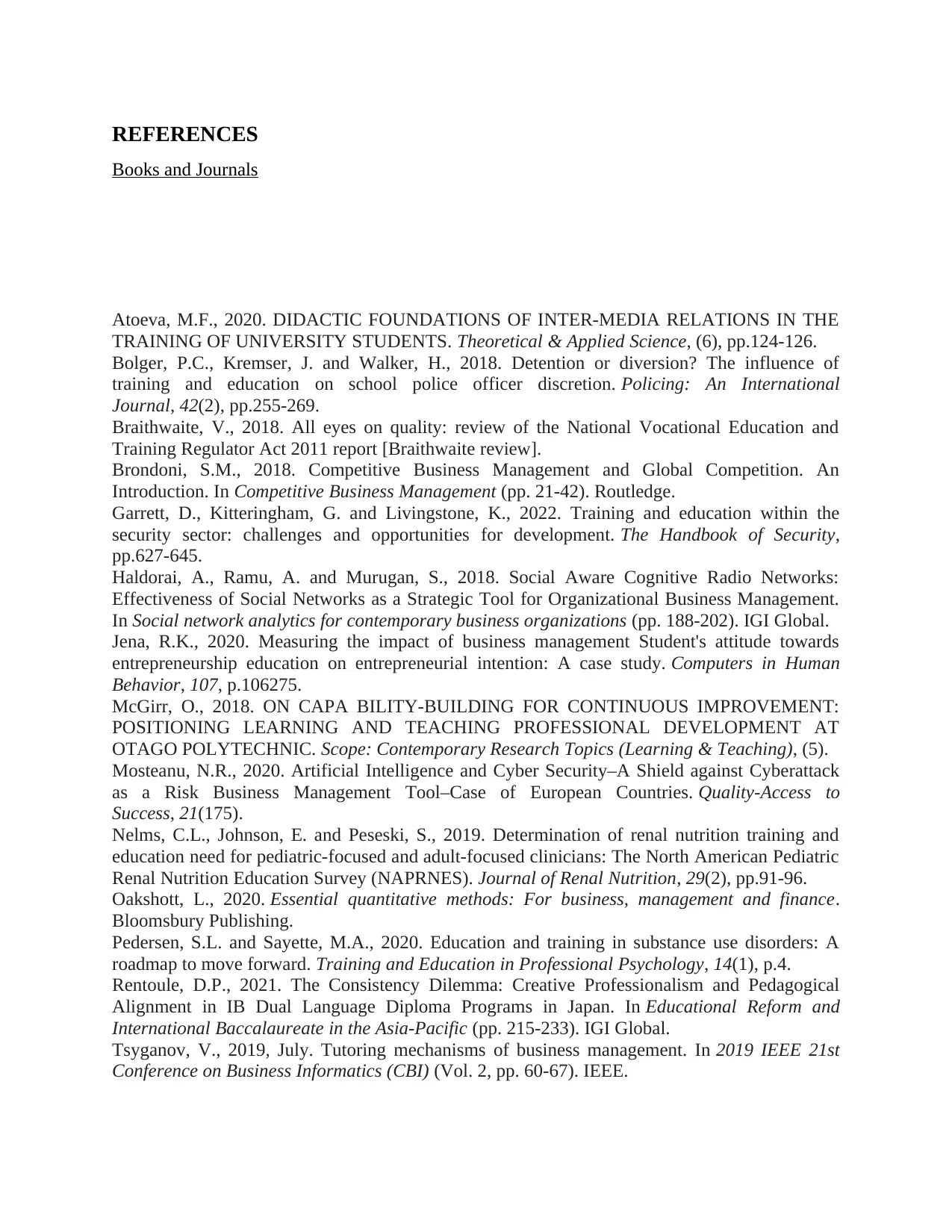
REFERENCES
Books and Journals
Atoeva, M.F., 2020. DIDACTIC FOUNDATIONS OF INTER-MEDIA RELATIONS IN THE
TRAINING OF UNIVERSITY STUDENTS. Theoretical & Applied Science, (6), pp.124-126.
Bolger, P.C., Kremser, J. and Walker, H., 2018. Detention or diversion? The influence of
training and education on school police officer discretion. Policing: An International
Journal, 42(2), pp.255-269.
Braithwaite, V., 2018. All eyes on quality: review of the National Vocational Education and
Training Regulator Act 2011 report [Braithwaite review].
Brondoni, S.M., 2018. Competitive Business Management and Global Competition. An
Introduction. In Competitive Business Management (pp. 21-42). Routledge.
Garrett, D., Kitteringham, G. and Livingstone, K., 2022. Training and education within the
security sector: challenges and opportunities for development. The Handbook of Security,
pp.627-645.
Haldorai, A., Ramu, A. and Murugan, S., 2018. Social Aware Cognitive Radio Networks:
Effectiveness of Social Networks as a Strategic Tool for Organizational Business Management.
In Social network analytics for contemporary business organizations (pp. 188-202). IGI Global.
Jena, R.K., 2020. Measuring the impact of business management Student's attitude towards
entrepreneurship education on entrepreneurial intention: A case study. Computers in Human
Behavior, 107, p.106275.
McGirr, O., 2018. ON CAPA BILITY-BUILDING FOR CONTINUOUS IMPROVEMENT:
POSITIONING LEARNING AND TEACHING PROFESSIONAL DEVELOPMENT AT
OTAGO POLYTECHNIC. Scope: Contemporary Research Topics (Learning & Teaching), (5).
Mosteanu, N.R., 2020. Artificial Intelligence and Cyber Security–A Shield against Cyberattack
as a Risk Business Management Tool–Case of European Countries. Quality-Access to
Success, 21(175).
Nelms, C.L., Johnson, E. and Peseski, S., 2019. Determination of renal nutrition training and
education need for pediatric-focused and adult-focused clinicians: The North American Pediatric
Renal Nutrition Education Survey (NAPRNES). Journal of Renal Nutrition, 29(2), pp.91-96.
Oakshott, L., 2020. Essential quantitative methods: For business, management and finance.
Bloomsbury Publishing.
Pedersen, S.L. and Sayette, M.A., 2020. Education and training in substance use disorders: A
roadmap to move forward. Training and Education in Professional Psychology, 14(1), p.4.
Rentoule, D.P., 2021. The Consistency Dilemma: Creative Professionalism and Pedagogical
Alignment in IB Dual Language Diploma Programs in Japan. In Educational Reform and
International Baccalaureate in the Asia-Pacific (pp. 215-233). IGI Global.
Tsyganov, V., 2019, July. Tutoring mechanisms of business management. In 2019 IEEE 21st
Conference on Business Informatics (CBI) (Vol. 2, pp. 60-67). IEEE.
Books and Journals
Atoeva, M.F., 2020. DIDACTIC FOUNDATIONS OF INTER-MEDIA RELATIONS IN THE
TRAINING OF UNIVERSITY STUDENTS. Theoretical & Applied Science, (6), pp.124-126.
Bolger, P.C., Kremser, J. and Walker, H., 2018. Detention or diversion? The influence of
training and education on school police officer discretion. Policing: An International
Journal, 42(2), pp.255-269.
Braithwaite, V., 2018. All eyes on quality: review of the National Vocational Education and
Training Regulator Act 2011 report [Braithwaite review].
Brondoni, S.M., 2018. Competitive Business Management and Global Competition. An
Introduction. In Competitive Business Management (pp. 21-42). Routledge.
Garrett, D., Kitteringham, G. and Livingstone, K., 2022. Training and education within the
security sector: challenges and opportunities for development. The Handbook of Security,
pp.627-645.
Haldorai, A., Ramu, A. and Murugan, S., 2018. Social Aware Cognitive Radio Networks:
Effectiveness of Social Networks as a Strategic Tool for Organizational Business Management.
In Social network analytics for contemporary business organizations (pp. 188-202). IGI Global.
Jena, R.K., 2020. Measuring the impact of business management Student's attitude towards
entrepreneurship education on entrepreneurial intention: A case study. Computers in Human
Behavior, 107, p.106275.
McGirr, O., 2018. ON CAPA BILITY-BUILDING FOR CONTINUOUS IMPROVEMENT:
POSITIONING LEARNING AND TEACHING PROFESSIONAL DEVELOPMENT AT
OTAGO POLYTECHNIC. Scope: Contemporary Research Topics (Learning & Teaching), (5).
Mosteanu, N.R., 2020. Artificial Intelligence and Cyber Security–A Shield against Cyberattack
as a Risk Business Management Tool–Case of European Countries. Quality-Access to
Success, 21(175).
Nelms, C.L., Johnson, E. and Peseski, S., 2019. Determination of renal nutrition training and
education need for pediatric-focused and adult-focused clinicians: The North American Pediatric
Renal Nutrition Education Survey (NAPRNES). Journal of Renal Nutrition, 29(2), pp.91-96.
Oakshott, L., 2020. Essential quantitative methods: For business, management and finance.
Bloomsbury Publishing.
Pedersen, S.L. and Sayette, M.A., 2020. Education and training in substance use disorders: A
roadmap to move forward. Training and Education in Professional Psychology, 14(1), p.4.
Rentoule, D.P., 2021. The Consistency Dilemma: Creative Professionalism and Pedagogical
Alignment in IB Dual Language Diploma Programs in Japan. In Educational Reform and
International Baccalaureate in the Asia-Pacific (pp. 215-233). IGI Global.
Tsyganov, V., 2019, July. Tutoring mechanisms of business management. In 2019 IEEE 21st
Conference on Business Informatics (CBI) (Vol. 2, pp. 60-67). IEEE.
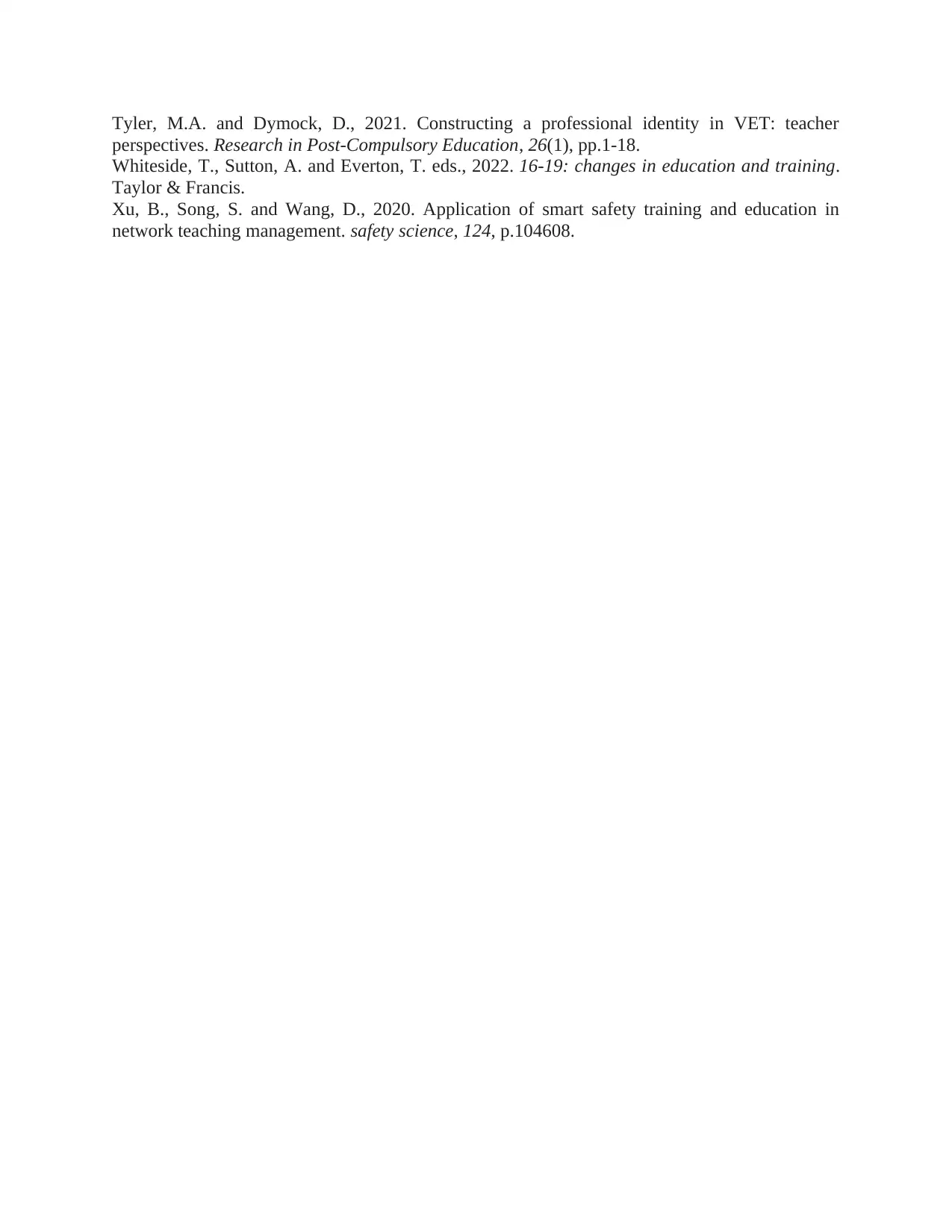
Tyler, M.A. and Dymock, D., 2021. Constructing a professional identity in VET: teacher
perspectives. Research in Post-Compulsory Education, 26(1), pp.1-18.
Whiteside, T., Sutton, A. and Everton, T. eds., 2022. 16-19: changes in education and training.
Taylor & Francis.
Xu, B., Song, S. and Wang, D., 2020. Application of smart safety training and education in
network teaching management. safety science, 124, p.104608.
perspectives. Research in Post-Compulsory Education, 26(1), pp.1-18.
Whiteside, T., Sutton, A. and Everton, T. eds., 2022. 16-19: changes in education and training.
Taylor & Francis.
Xu, B., Song, S. and Wang, D., 2020. Application of smart safety training and education in
network teaching management. safety science, 124, p.104608.
1 out of 16
Related Documents
Your All-in-One AI-Powered Toolkit for Academic Success.
+13062052269
info@desklib.com
Available 24*7 on WhatsApp / Email
![[object Object]](/_next/static/media/star-bottom.7253800d.svg)
Unlock your academic potential
© 2024 | Zucol Services PVT LTD | All rights reserved.

